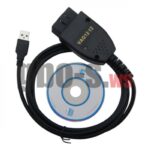Having trouble resetting the “Long-term adaptation of reduction agent dosage” on your 3.0 TDI engine using VCDS? You’re not alone. This guide will delve into the process, common issues, and potential solutions. A stuck adaptation value, often at 1.35 instead of the desired 1.00, can lead to persistent AdBlue warnings and check engine lights.
Understanding the DEF System and Adaptation
The Diesel Exhaust Fluid (DEF) system, also known as AdBlue, is crucial for reducing NOx emissions in modern diesel vehicles. The system injects DEF into the exhaust stream, where it reacts with harmful NOx gases in the SCR catalyst, converting them into harmless nitrogen and water.
The “Long-term adaptation of reduction agent dosage” value in VCDS reflects the learned behavior of the DEF injection system. This value adjusts based on various factors, including driving conditions and component performance. A value significantly different from 1.00 can indicate a problem within the system, preventing optimal DEF injection and triggering fault codes.
Resetting the 3.0 TDI DEF Adaptation with VCDS
To reset the adaptation using VCDS, follow these steps:
- Connect VCDS: Ensure your VCDS interface is properly connected to your vehicle’s OBD-II port and your laptop.
- Select Engine Control Module: Navigate to Select Control Module -> 01-Engine.
- Access Basic Settings: Within the Engine module, go to Basic Settings – 04.
- Choose Adaptation Channel: From the drop-down menu, select Resetting learning values for reduction agent metering system (IDE03402).
- Execute Reset: Click Go!. A “Finished correctly” message should appear.
Verification: After the reset, check the Advanced Measuring Values – 08 and look for Long-term adaptation of reduction agent dosage. The value should now be 1.00.
Troubleshooting: “Routine Not OK” After Reset
Even with a “Finished correctly” message, you might encounter a “routine not ok” status. This indicates the reset was unsuccessful. Here are potential causes and solutions:
-
Faulty DEF Pump or Injector: A malfunctioning pump or injector can prevent proper DEF delivery and hinder the reset process. Consider replacing these components with genuine parts like Bosch 0444021021 DEF Module, Bosch Metering Module, and Bosch DEF Pump.
-
NOX Sensor Issues: Faulty NOx sensors can provide inaccurate readings, impacting the adaptation process. Replacing NOx Sensor 2, a common culprit, might resolve the issue.
-
Clogged EGR and Cooler: A clogged Exhaust Gas Recirculation (EGR) system and cooler can disrupt exhaust flow and affect NOx reduction. Cleaning these components might be necessary.
-
DEF Quality: Ensure you’re using high-quality DEF that meets ISO 22241 standards. Contaminated or low-quality DEF can cause various problems.
-
Wiring or Connector Problems: Inspect the wiring and connectors related to the DEF system for damage or corrosion. Any issues found should be addressed.
Further Diagnostics and Considerations
If the problem persists, further diagnostics are required:
- VCDS Logs: Analyze VCDS logs for anomalies in NOx sensor readings, DEF pressure, and injector activation. The provided logs show a consistent “Long-term adaptation of reduction agent dosage” of 1.35, indicating a persistent issue.
- DEF Metering Test: Perform a DEF metering test using VCDS to assess pump and injector performance. A volume of 15-16ml, even with a new pump and injector, suggests a problem.
- Professional Assistance: If you’re unable to resolve the issue, consult a qualified automotive technician specializing in diesel emissions systems.
Conclusion
Resetting the 3.0 TDI DEF pump cycle with VCDS can be straightforward, but underlying issues can complicate the process. By understanding the system, following the correct procedure, and systematically troubleshooting potential problems, you can effectively address a stuck adaptation value and restore proper DEF system function. Remember to use quality DEF and consult a professional if needed.

